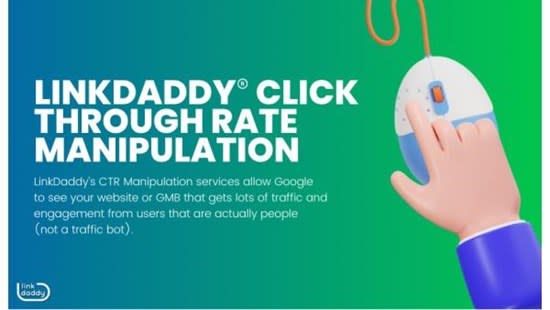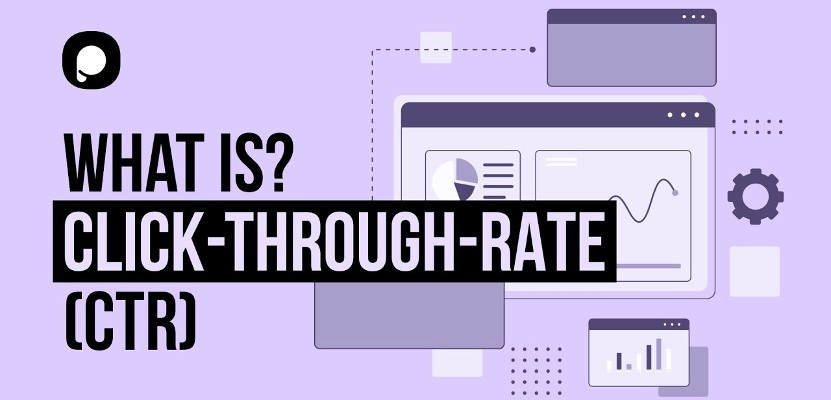LinkDaddy CTR Manipulation: Specialized Solutions for Improved Web Traffic
Wiki Article
Checking Out the Connection Between CTR Adjustment Providers and Individual Actions
In the realm of digital advertising and marketing, the influence of click-through price (CTR) manipulation services on customer habits continues to be a complicated and intriguing subject. By dissecting the elaborate partnership between CTR control services and user habits, interesting insights emerge that may improve our understanding of electronic advertising and marketing approaches and their results on consumers.Effect of CTR Adjustment on Habits
Assessing the influence of Click-Through Price (CTR) control on user actions reveals important understandings right into the dynamics of online engagement. CTR control entails synthetically blowing up the number of click a particular link or ad to deceive users and search engines. This technique can bring about an altered assumption of a web page's appeal or significance, eventually affecting customer habits.
Moreover, CTR control can skew the information made use of by formulas to customize customer experiences. This can cause customers being offered web content that does not line up with their preferences or interests, inevitably causing a decrease in user contentment and engagement. Understanding the effect of CTR adjustment on individual habits is essential for preserving openness and count on on the internet interactions.
User Engagement With Adjusted CTR
Customer involvement with controlled CTR data commonly leads to manipulated understandings of on the internet material appeal and significance. When individuals interact with material based upon synthetically inflated Click-Through Fees (CTR), they may think that specific details, items, or solutions are more prominent or credible than they in fact are. This can lead to customers making decisions based on misleading information, resulting in potentially undesirable end results.Engagement metrics like likes, shares, remarks, and time spent on a website are often affected by CTR adjustment. Customers might be extra likely to engage with web content that appears to have greater engagement prices, even more perpetuating the cycle of skewed perceptions. Consequently, content designers and advertisers might focus on producing content that creates high CTR instead of concentrating on developing truly important and appropriate material.

Psychological Effects of CTR Manipulation

In addition, the psychological impacts of CTR adjustment can also materialize in altered decision-making procedures. Individuals may be extra inclined to click on web content solely based upon its regarded appeal, as opposed to its real value or relevance to their demands. This behavioral change can cause a superficial involvement with on the internet content, where individuals might forget top notch but less preferred offerings for those with synthetically increased CTRs.
Basically, the mental implications of CTR adjustment highlight the relevance of preserving openness and authenticity in on-line communications to cultivate authentic individual involvement and depend on.
Ethical Considerations in CTR Manipulation
Thinking about the moral effects of manipulating click-through prices (CTR) in on-line systems is imperative for maintaining stability and trust within the electronic environment. CTR control increases problems about deceiving customers, distorting information analytics, and jeopardizing the trustworthiness of online web content. One major honest consideration is the prospective effect on individual autonomy and decision-making. By artificially inflating CTR, customers might be deceived right into clicking web links or ads they would not have actually chosen otherwise, resulting in a disingenuous online experience. CTR manipulation can skew the efficiency metrics that organizations count on to visit the website make strategic choices, inevitably influencing market competitors and consumer trust.Another ethical facet to ponder is the justness of controling CTR to acquire an unjust advantage over competitors. Participating in such methods not just goes against concepts of fair game yet likewise weakens the depend on that users position in on-line platforms. It is essential for services and electronic online marketers to promote moral standards in their practices to make sure transparency, trustworthiness, and long-term sustainability in the online environment.
Implications for Digital Advertising And Marketing
CTR adjustment can lead to manipulated information analytics, misinforming marketing professionals right into believing that their projects are doing much better than they actually are. When customers realize that CTRs have actually been controlled, it can wear down trust fund in the brand, leading to long-term negative consequences for client commitment and brand track record.Furthermore, the use of CTR control services can produce an unreasonable affordable landscape, where firms see here now that take part in such techniques obtain a fabricated benefit over those that abide by moral advertising standards. This can suppress innovation and creative thinking in digital advertising, as success ends up being more about adjustment techniques than providing genuine value to consumers. Ultimately, the effects of CTR manipulation for digital marketing expand beyond temporary gains, impacting the total sustainability and see this here reliability of marketing initiatives in the electronic world.
Conclusion
To conclude, the connection between CTR manipulation services and user behavior is complex and multifaceted. The influence of CTR control on behavior, individual involvement with controlled CTR, psychological effects, ethical factors to consider, and implications for electronic advertising and marketing all contribute fit this partnership. Comprehending these characteristics is crucial for online marketers and scientists alike in order to browse the honest effects and make the most of the effectiveness of their electronic advertising methods.Report this wiki page